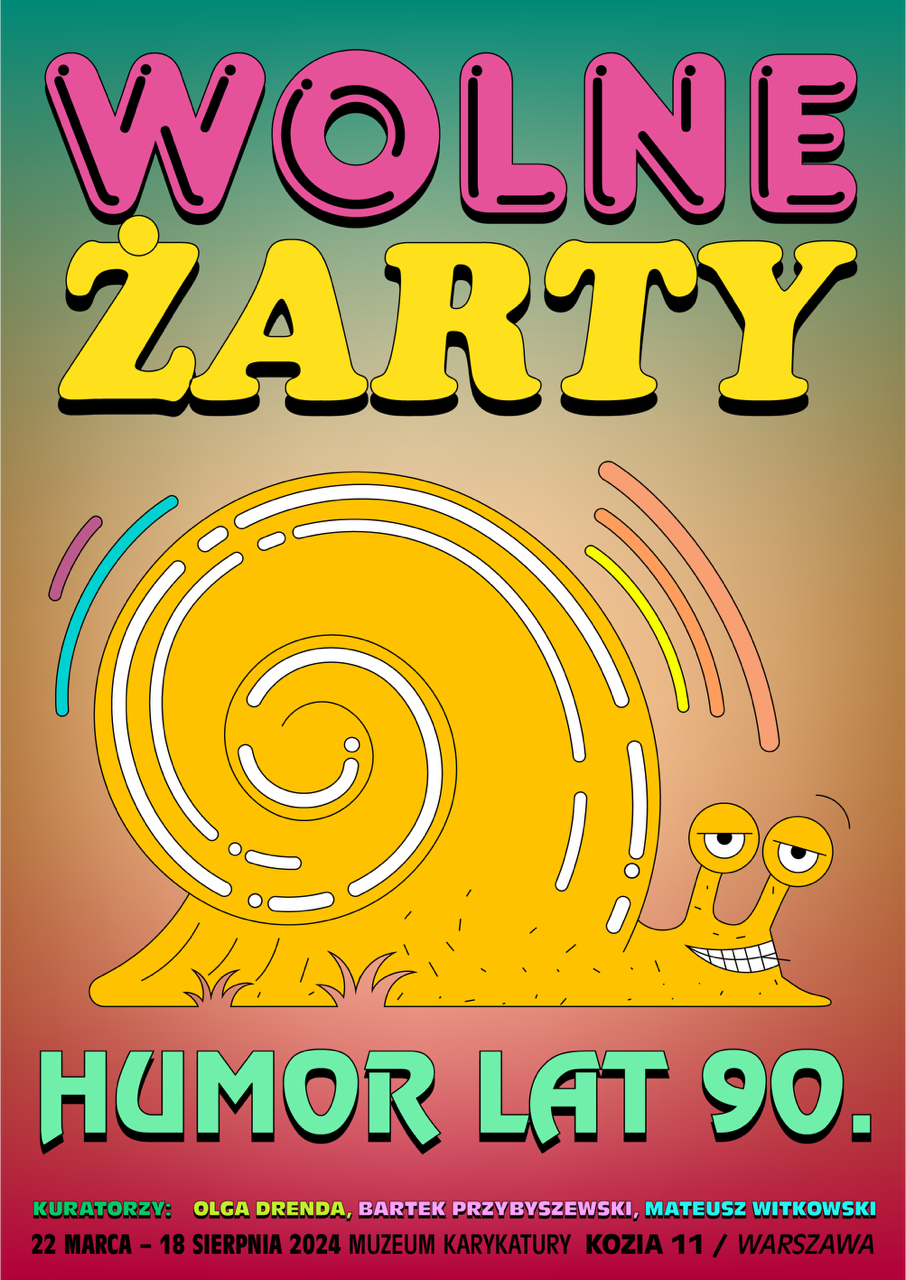
FREE TO JOKE
HUMOUR OF THE 1990.
22 March – 18 August 2024
extended till 1st September 2024
We invite you to an exhibition dedicated to humour. The exhibition "Free Jokes. Humour of the 1990s" will be an opportunity to recall what we laughed at in the last decade of the 20th century in the press, radio and television. We will show the broad landscape of humor of the Third Republic of Poland.
The exhibition was prepared by the curatorial team: Olga Drenda and the creators of Podcastex: Mateusz Witkowski and Bartek Przybyszewski with Michał Rzecznik and Zuzanna Berus (Museum of Caricature).
Graphic design - Dominik Cymer - graphic designer and illustrator.
As part of the exhibition, we have planned numerous meetings, guided tours and workshops.
"Ladies and Gentlemen, on 4 June 1989 satire came to an end in Poland", as Joanna Szczepkowska said... never.
And yet, she could have. After all, it is generally believed that the systemic transformation of our country marked the end of brilliant, understated Aesopian wit. The all-encompassing supermarket culture, as the critic Tadeusz Sobolewski bluntly put it, condemned us to wander between crude and literal satire in search of oases of abstraction and creativity. Our exhibition defies such opinions, and at the same time fully confirms that they are valid (oh, how fickle we are!).
And that is exactly the point: for us, the word "free" means more than just "not subject to censorship". The 1990s in Poland saw a rich explosion of various satirical forms: both the less sophisticated and also the abstract, challenging the viewer. The nasty and the noble. The rough and the refined. Finally: the professional and the grassroots. Our exhibition features work by illustrators held in high regard before 1989 (e.g. Andrzej Mleczko, Andrzej Czeczot), alongside future classics (e.g. Marek Raczkowski) as well as underground works, zines, etc. While playing the then-popular TV alien (?) Zulu Gula, Tadeusz Ross argued: "the citizens of our very interesting country had trouble grasping the multiplying nuances of the new reality", which is perhaps why the humour of the time was as profuse as it was coarse. We decided not to fear any of its numerous faces.
Here, caricature intersects with comic strips, layered metaphors sit side by side with raunchy sex jokes, and finally: paper mingles with the digital realm. After all, the now charmingly dated term "multimedia" played a significant role in the 1990s. Therefore, we do not limit ourselves to the analogue work of satirical artists – we also reach for the television of the time (comedy shows, but also avant-garde experiments of Totart), jokes straight from the Internet (definitely capitalised!) or COMICAL music.
Finally, examples of satire referring to pop culture and advertising demonstrate how much changed during the few years of the transformation. As the saying goes, people living in Poland will not laugh at the circus, but at the Museum of Caricature you are FREE to laugh, in fact you should.
Olga Drenda - writer, journalist, translator, graduate of Ethnology and Cultural Anthropology at the Jagiellonian University.
Bartek Przybyszewski - journalist, podcaster, blogger, graduate of film studies at Jagiellonian University and andragogy at Warsaw University. Author of the blog "Numerous Puncture Wounds", where he writes mainly about film, comics and board games.
Mateusz Witkowski - journalist, podcaster, literary and music critic. Editor-in-chief and co-founder of the Popmoderna.pl portal.
curatorial team: Olga Drenda, Bartek Przybyszewski, Mateusz Witkowski
exhibition design and artwork: Dominik Cymer
oftware and electronics: Michał Urbański, Krzysiek Pochwała
curator on the part of the Museum of Caricature: Michal Rzecznik
curatorial cooperation on the part of the Museum of Caricature: Zuzanna Berus
setting of the works and cooperation in arranging the exhibition: Leszek Modzelewski
director: Paweł Płoski
programme: Michal Rzecznik
administration: Monika Portka, Alina Zatorska, Anna Lewicka
promotion: Katarzyna Miękus
education: Zuzanna Berus
documentation collections department: Piotr Kułak, Paulina Pilcicka, Aldona Tołysz
English translation: Łukasz Kotyński
Ukrainian translation: Iuliia Bystrytska


